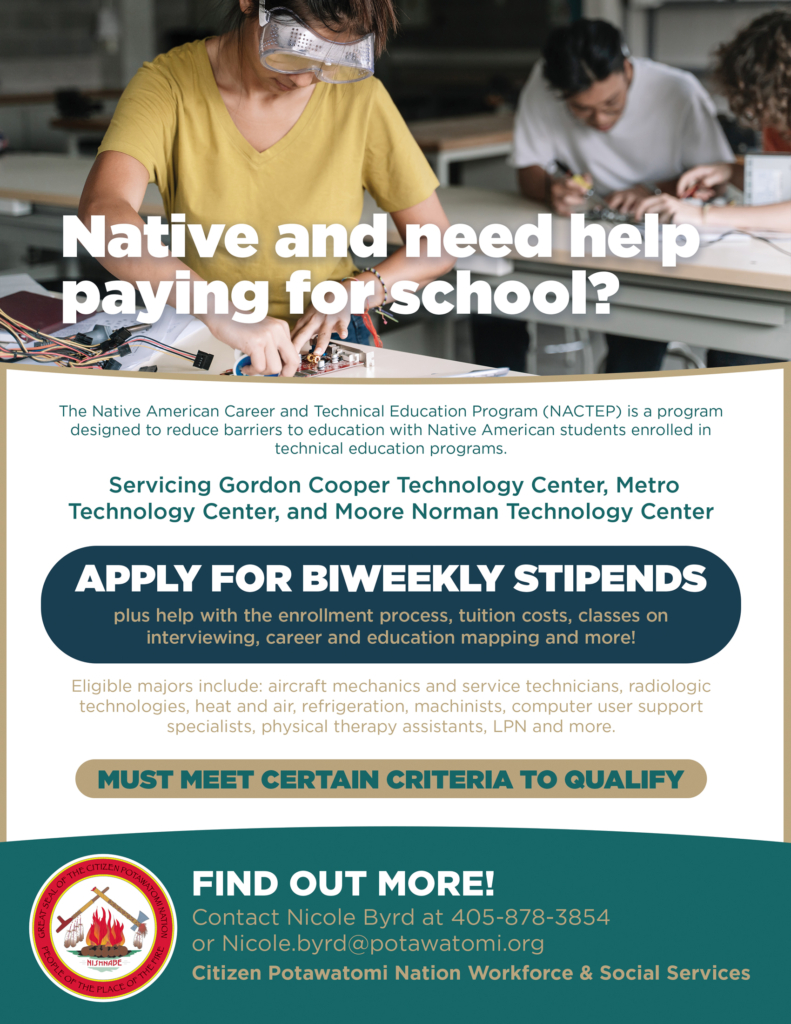The U.S. Department of Education awards millions of dollars for the Native American Career and Technical Education Program each year. In 2021, Citizen Potawatomi Nation received funds as one of 39 federally recognized tribes, tribal organizations and Bureau of Indian Affairs-funded schools to advance educational and career opportunities for Indigenous peoples and their communities.
CPN Workforce and Social Services career advisors Norma Neely and Nicole Byrd assist program participants with everything from selecting a major to finding a position after graduation.
“We don’t provide a handout; we provide a hand up,” Byrd said. “And I’ve kind of told myself that motto every time I do anything with any client is just, ‘I’m giving them a hand up. This is helping them to create a better future for not only themselves but our community as a whole.’”
Using NACTEP funds, Workforce and Social Services pays participants to attend specific programs at technical institutes or vocational schools in the department’s six-county jurisdiction. They have agreements with Metro Technology Centers, Gordon Cooper Technology Center and Moore Norman Technology Center. Native Americans of any tribe who reside in Lincoln, Payne, Cleveland, Seminole, Pottawatomie or Oklahoma counties qualify to apply.
“The uniqueness [of this program] comes from the fact that this is only for technical centers. And we’re really putting a focus on boosting Native population in the technical centers. Each of the technical centers that we’ve talked to has a very, very small Native population,” Byrd said.

Following thorough research, the department selected a limited number of high-paying, high-yield jobs to support at each school. Those include aircraft mechanics and service technicians, radiologic technologies, heat and air, refrigeration, machinists, computer user support specialists, physical therapy assistants, licensed practical nursing and others. The research focused on anticipated demand in the next five to 10 years and the communities’ need to fill those positions.
“We really want them in careers,” Neely said. “We don’t want them to just get a job. We want it to be something that will enable their family to live nicely. … And when you look at the programs that are offered, the approved programs, you’re going to see, these are ones that have a starting salary of at least $17.40 an hour,” with the potential to increase in the next five years.
Currently, popular programs include aircraft mechanics, licensed practical nursing and CNC small machinery, many of which lack diversity. The program’s clients range from 17 to 40, and concurrent enrollment is available for those completing their high school diplomas.
“We have one high school student who I believe is almost on Gordon Cooper’s campus all day,” Byrd said. “He is a senior in high school, and I believe he finished almost all of his course requirements for high school. He’s working through his courses at Gordon Cooper really fast, faster than most high school students do.”
While Workforce clients attend classes and other program obligations, the department pays them minimum wage for their time in school. Byrd and Neely see it as an opportunity to help overcome a significant barrier that prevents people from earning a certification to obtain a better job and increase their pay.
“A lot of the times, this wouldn’t be an option for people because they would have to work full time in order to support their families. But this kind of gives them some reprieve where they don’t have to worry about money so much. They can just focus on school,” Byrd said.
“It is a little bit shocking, I think, whenever we tell people that, ‘Yeah, we’re going to pay you to go to school.’ And I think everybody just thinks, ‘Wow, this is amazing.’”
If a Pell grant or other type of funding covers tuition, the NACTEP and Workforce help their clients in various other ways. That includes money for books, supplies, childcare, gas vouchers, tools and necessary clothing.
“We’re really excited that we get people that think, ‘Oh gosh, I really couldn’t go anywhere. I’m just going to have to make it, get by. I really can’t have a career because … I’m a single mom, and I’ve got kids. And how could I do this?’ Well, that’s where Workforce comes in handy,” Neely said.
She and Byrd enjoy feeling as if they make a difference in people’s lives for the better. Two of their clients are single moms in LPN programs.
“They’re getting ready to graduate, and that’s really exciting because they’re creating a future. They both have kids, and they’re creating a future for those kids. And I think it’s really exciting that we’re getting to support them through their school, and we’re getting to help them with their kids,” Byrd said.
Some students know their goals and which program they want to pursue; however, Workforce guides indecisive clients as well. Byrd and Neely discuss their options, schedule interest testing through the CPN Department of Education and more.
“If somebody said, ‘Well, gosh, I kind of like welding, but don’t they have to wear those big hats? I wonder if they’re hot, those face shields?’ Well, we could contact one of those people, and they would arrange a tour (at the technical institute). They would let them see it in action. … A lot of times, you think you wouldn’t like something until you actually get out there and see it,” Neely said.
Following graduation, their clients automatically enter Workforce and Social Service’s adult employment program for assistance in finding a job using their new certificate and training.
“We’ll help them with resume writing if they need that. And there are several departments here that help with that. It doesn’t just stop with, ‘You get your certificate and goodbye.’ We really want to follow through because the goal is to have people in these jobs that pay well,” Neely said.
Workforce and Social Services hopes to serve 30 clients annually over the next five years for a total of 150 students and expand the program to more technological institutes. Byrd and Neely plan to build a waiting list for additional clients. They note that many programs follow different academic schedules, and the length of time on the waiting list varies.
Those in the program must maintain their grade point average and regularly attend class. Byrd and Neely frequently check in with their clients, hoping that many of them come to work for the Tribe after graduation.
“The Citizen Potawatomi are very happy that this is happening because they need employees. They need well-qualified employees, and many of those positions would work right into some jobs at the Citizen Potawatomi Nation,” Neely said.
She and Byrd agree they see no downsides to the program or applying — only possibility.
“No excuses. If you really want to have a career that will lead to a real fulfilling life, here’s your chance to do it. Work hard. Get this done. We can help you,” Neely said.
Visit the Workforce and Social Service Department webpage at cpn.news/workforce. Find out more information about the Native American Career and Technical Education Program by emailing Nicole Byrd at nicole.byrd@potawatomi.org or call 405-878-3854.

